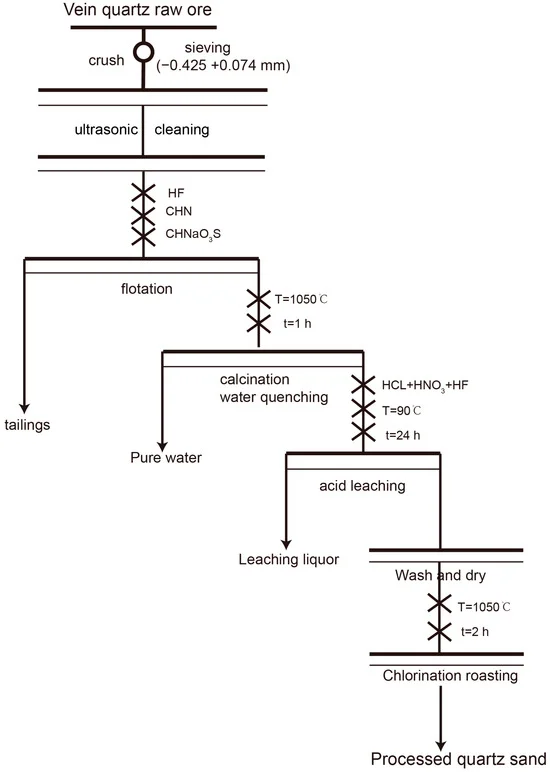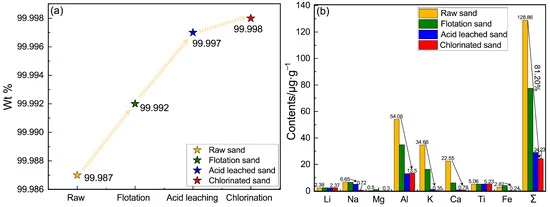- cross-posted to:
- arstechnica_index@rss.ponder.cat
- cross-posted to:
- arstechnica_index@rss.ponder.cat
It also totally shut down the only supply for high quality quartz in the world. Like literally every electronic device that requires a silicon chip is dependent on those 2 mines in Spruce Pine.
It’s wild how so much of the worlds critical raw material is still extracted in the most chronically impoverished parts of Appalachia.
 isn’t it cool how this shit isn’t reported nearly as much as it should be, so you end up finding this out on a message board instead of fucking cnn?
isn’t it cool how this shit isn’t reported nearly as much as it should be, so you end up finding this out on a message board instead of fucking cnn?I legitimately had no clue
Learning more about economics and media over the years has made me realize how much of “business news” in the west is just bourgeois mouthpieces conspiring to bury unflattering stories that might scare the markets and hurt their owners’ bottom lines
Like that should be pretty obvious in retrospect looking at how mass media in the west is funded and who owns and invests in it as a material analysis, but it’s shocking how thoroughly “huge example of how fucked (aspect of American economy) is” stories get relegated to brief passing mentions if not completely buried and totally verboten to report


Democracy Dies in Dogshit™️
“Every bank is a Stock Exchange,’ and the bigger the bank, and the more successful the concentration of banking, the truer does this modern aphorism ring.” “While formerly, in the seventies, the Stock Exchange, flushed with the exuberance of youth” (a “subtle” allusion to the Stock Exchange crash of 1873, the company promotion scandals, etc.), “opened the era of the industrialisation of Germany, nowadays the banks and industry are able to ‘manage it alone.’ The domination of our big banks over the Stock Exchange … is nothing else than the expression of the completely organised German industrial state. If the domain of the automatically functioning economic laws is thus restricted, and if the domain of conscious regulation by the banks is considerably enlarged, the national economic responsibility of a few guiding heads is immensely increased”, so writes the German professor Schulze-Gaevernitz, an apologist of German imperialism, who is regarded as an authority by the imperialists of all countries, and who tries to gloss over the mere “detail” that the “conscious regulation” of economic life by the banks consists in the fleecing of the public by a handful of “completely organised” monopolists. The task of a bourgeois professor is not to lay bare the entire mechanism, or to expose all the machinations of the bank monopolists, but rather to present them in a favourable light. pg.51-52
(…)
It should be noted that German — and not only German — bourgeois scholars, like Riesser, Schulze-Gaevernitz, Liefmann and others, are all apologists of imperialism and of finance capital. Instead of revealing the “mechanics” of the formation of an oligarchy, its methods, the size of its revenues “impeccable and peccable”, its connections with parliaments, etc., etc., they obscure or gloss over them. They evade these “vexed questions” by pompous and vague phrases, appeals to the “sense of responsibility” of bank directors, by praising “the sense of duty” of Prussian officials, giving serious study to the petty details of absolutely ridiculous parliamentary bills for the “supervision” and “regulation” of monopolies, playing spillikins with theories, like, for example, the following “scholarly” definition, arrived at by Professor Liefmann: “Commerce is an occupation having for its object the collection, storage and supply of goods.” (The professor’s bold-face italics.) … From this it would follow that commerce existed in the time of primitive man, who knew nothing about exchange, and that it will exist under socialism! pg.58-59
(…)
None of the rules of control, the publication of balance-sheets, the drawing up of balance sheets according to a definite form, the public auditing of accounts,etc., the things about which well-intentioned professors and officials — that is, those imbued with the good intention of defending and prettyfying capitalism — discourse to the public, are of any avail; for private property is sacred, and no one can be prohibited from buying, selling, exchanging or hypothecating shares, etc. pg.60
(…)
On the economic basis referred to above, the political institutions of modern capitalism — press, parliament, associations, congresses, etc. — have created political privileges and sops for the respectful, meek, reformist and patriotic office employees and workers, corresponding to the economic privileges and sops. Lucrative and soft jobs in the government or on the war industries committees, in parliament and on diverse committees, on the editorial staffs of “respectable”, legally published newspapers or on the management councils of no less respectable and “bourgeois law- abiding” trade unions — this is the bait by which the imperialist bourgeoisie attracts and rewards the representatives and supporters of the “bourgeois labour parties”. pg.133




I need to brush up on my Lenin, it’s amazing how succinct and on the money he was about everything more than a century ago
first learning about appalachian mining towns in the “good old days” before they were left to deteriorate was quite an experience. It was pretty much just a system of mineral-serfdom. The mining companies owned literally everything, including all the stores (which were basically one megastore), and they wouldn’t even pay the workers real money. They’d pay the workers in scrip, ie fake money that could only be used in the stores they owned (LITERALLY MONOPOLY MONEY). So even if people wanted to move, they had no way to ever save up to because they weren’t actually being paid in real wages. No wonder appalachia was so revolutionary. The ruling class deserve(d/s) worse than the coal wars tbh
does china really not have its own source?
They’ve identified it as a critical resource (as has a number of other countries - Australia has a few startups to commence mining it)
High-purity quartz [which is used across the solar manufacturing sector and also for computer chips]—most of it comes from the US.
[Ultra-pure quartz] is actually one example where there’ve been a lot of joint public-private efforts to develop more ultra-pure quartz capacity in China. They’re investing in domestic production because that’s one sector where North America dominates current production. [Two American companies in North Carolina] produce like 180,000 tons of ultra-pure quartz a year; [Jiangsu Pacific Quartz Products, a Chinese company] is scaling up [its capacity] this year from 5,000 to 20,000 tons; and that’s basically all of the global production.
https://www.technologyreview.com/2023/09/13/1079377/china-clean-tech-supply-chain/
It is possible to refine lower quality quartz into higher quality quartz but it is very energy intensive.
The entire global market is only $1 billion so that’s part of the reason why there hasn’t been much competition.
 thank you
thank youCan’t they make high quality quartz in a lab like diamonds and sapphires?
It’s possible but difficult - I believe there’s research underway on how to better synthesise extremely high purity silicon dioxide (99.9999%) for sub-3nm semiconductors. Nothing at the volume required.
Here is an existing purification method for high purity quartz (99.98%)


You can also see that some elements are particularly troublesome to remove - lithium, aluminium and titanium.
Thank you for the information! I have another question if you don’t mind.
If the global market is only 1B why should anyone worry about this? I’m getting the impression that silicone chips aren’t that important and might even have better substitutions. Am I wrong to think this way?
It would be an issue if someone nuked Spruce Pine as it would take a reasonable amount of time to survey and prepare mining infrastructure for other sites.
High purity quartz is very important but there’s probably enough existing inventory for the mines to commence operating again (and there’s still all the stuff in the refining and purification chain).
It’s just concentrated in NC because it’s relatively cheap and low volume - $5 a kg, similar to the price of zinc except that zinc mining and demand volumes are ~100 times higher. They have the biggest known deposit so there’s no point to develop your own mining and refining industry unless you think your country will be cut off.
Or another example, most of the world’s cobalt is mined in the Democratic Republic of the Congo, and there would be huge supply chain disruptions if you nuked the DRC - but that doesn’t mean that cobalt has little value. Of course in they scenario, other mines would open (or reopen, in the case of Australia which was the primary cobalt producer until the ~late 90s).
They exported $200 million vs the US’s $80 million in 2021 so I imagine so. Unless the type of quartz is very different, this seems like an exaggeration.
They are pretty different:
High-purity quartz products are categorized into four grades based on SiO2 purity: ultra-high purity (ω(SiO2) ≥ 99.998% or 4N8), high-purity (ω(SiO2) ≥ 99.995% or 4N5), medium-purity (ω(SiO2) ≥ 99.99% or 4N), and standard-purity (ω(SiO2) ≥ 99.9% or 3N).
High-purity quartz products are categorized into four grades … standard-purity
you telling me that i can buy standard-purity high-purity quartz? thats fucked up
Wait what? That is actually astonishing
I was just about to comment on the quartz mining. The rail lines have been destroyed as well, so they can’t access what has been mined. Plus, a lot of that ended up washed away in the floods, it’s why some of the flood deposits look like straight up beach sand.
It is crazy to think about how centralised, and thereby vulnerable, the production of medical supplies is. Knocking out a single plant, for whatever reason, should not cut the supply of something as basic as IV fluid for hundreds of millions of people in half.
It’s the range with medicines. The reason why ADHD meds has skyrocketed is a combination of US regulators fucking with the supply of amphetamine salts and US pharma sitting on their stockpiles, deliberately causing artificial scarcity. If capitalism worked the way we’re told it is supposed to, plants in Europe or Asia or Latin America would pick up the slack but no, the entire world’s supply of an entire group of medicines depends on a bunch of yanks not fucking people over.
and ooh boy do they love fucking people over
deleted by creator
Has US government announced any form of aid/help over to NC/Tennessee outside of the usual “aid” to Israel/Ukraine/Taiwanese province of China?
That would require congress to stop their vacation. So no :(
I don’t even think trump/Vance or Harris/walz are going to pay them a visit.
Doesn’t congress go back to “work” in about a month or so? Everything is fine.
“We must immediately act to conserve fluids”
Heh








